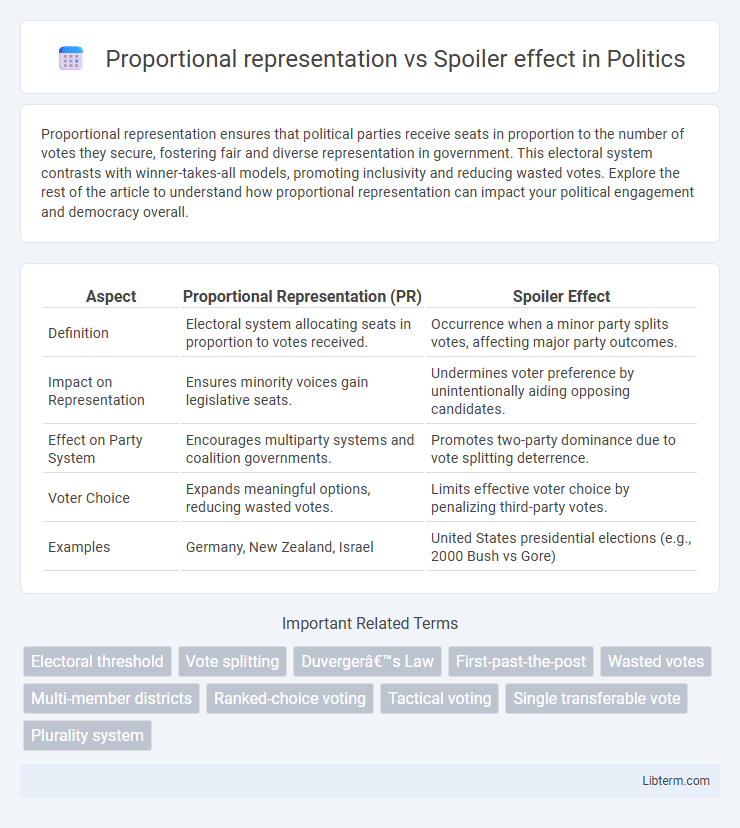Proportional representation ensures that political parties receive seats in proportion to the number of votes they secure, fostering fair and diverse representation in government. This electoral system contrasts with winner-takes-all models, promoting inclusivity and reducing wasted votes. Explore the rest of the article to understand how proportional representation can impact your political engagement and democracy overall.
Table of Comparison
| Aspect | Proportional Representation (PR) | Spoiler Effect |
|---|---|---|
| Definition | Electoral system allocating seats in proportion to votes received. | Occurrence when a minor party splits votes, affecting major party outcomes. |
| Impact on Representation | Ensures minority voices gain legislative seats. | Undermines voter preference by unintentionally aiding opposing candidates. |
| Effect on Party System | Encourages multiparty systems and coalition governments. | Promotes two-party dominance due to vote splitting deterrence. |
| Voter Choice | Expands meaningful options, reducing wasted votes. | Limits effective voter choice by penalizing third-party votes. |
| Examples | Germany, New Zealand, Israel | United States presidential elections (e.g., 2000 Bush vs Gore) |
Introduction to Proportional Representation
Proportional representation is an electoral system designed to allocate seats in a legislature in proportion to the votes each party receives, ensuring fairer representation of diverse political views. Unlike winner-takes-all systems prone to the spoiler effect, proportional representation minimizes wasted votes and encourages multiparty competition. This system enhances democratic legitimacy by reflecting the electorate's preferences more accurately in parliamentary composition.
Understanding the Spoiler Effect
The spoiler effect occurs when a third-party or independent candidate draws votes from a major candidate with similar views, potentially causing the opposing candidate to win. In plurality voting systems, this effect distorts true voter preferences and undermines fair representation. Proportional representation reduces the spoiler effect by allocating seats based on the percentage of votes each party receives, ensuring minority viewpoints gain appropriate legislative influence.
Historical Context of Voting Systems
The historical context of voting systems reveals that proportional representation emerged in the early 20th century as a solution to the limitations of plurality systems, addressing the spoiler effect where similar candidates split votes, allowing less popular candidates to win. Proportional representation ensures fairer reflection of voter preferences by allocating seats based on overall vote shares, reducing wasted votes and minimizing spoilers. Early adoption in countries like Germany and the Netherlands demonstrated how this system stabilized fragmented party landscapes, contrasting with plurality systems that often led to strategic voting and distorted outcomes.
How Proportional Representation Works
Proportional representation allocates legislative seats based on the percentage of votes each party receives, ensuring a more accurate reflection of voter preferences. This electoral system reduces the spoiler effect by allowing smaller parties to gain representation without splitting the vote and inadvertently aiding less-preferred candidates. By translating votes directly into seats, proportional representation fosters multiparty collaboration and minimizes wasted votes common in plurality voting systems.
The Mechanics Behind the Spoiler Effect
The spoiler effect occurs when a third-party or less popular candidate divides the vote among similar constituencies, causing a less favored candidate to win under a plurality voting system. Proportional representation systems mitigate this by allocating seats based on overall vote share, allowing multiple parties to gain representation without vote splitting consequences. This mechanism reduces strategic voting and encourages a more diverse political landscape by reflecting voter preferences more accurately.
Comparing Electoral Outcomes
Proportional representation systems allocate seats based on the percentage of votes each party receives, resulting in a more accurate reflection of voter preferences and minimizing wasted votes. In contrast, the spoiler effect in plurality or majoritarian systems can cause vote splitting among similar candidates, often allowing a less popular candidate to win by dividing the opposition. Consequently, proportional representation tends to produce more inclusive and representative electoral outcomes, while plurality systems are prone to distortions caused by the spoiler effect.
Voter Representation and Fairness
Proportional representation ensures that political parties receive seats in alignment with their share of the vote, enhancing voter representation by reflecting diverse preferences more accurately. The spoiler effect often distorts election outcomes by splitting votes among similar candidates, leading to unrepresentative winners and undermining fairness. Implementing proportional representation mitigates voter disenfranchisement and promotes equitable competition among parties.
Impact on Political Parties
Proportional representation enhances the diversity of political parties by allocating seats based on the percentage of votes received, enabling smaller and emerging parties to gain representation and influence policy decisions. The spoiler effect in plurality voting systems often leads to vote splitting, indirectly favoring major parties and discouraging voter support for minor parties due to fear of wasting votes. Consequently, proportional representation fosters multi-party systems and encourages political pluralism, while the spoiler effect tends to reinforce two-party dominance and limits political competition.
Real-World Case Studies
Proportional representation systems in countries like Germany and New Zealand have demonstrated reduced spoiler effects by enabling multiple parties to gain seats relative to their vote share, thus fostering coalition governments and diverse political representation. In contrast, the United States' first-past-the-post electoral system often magnifies the spoiler effect, as seen in the 2000 presidential election where Ralph Nader's candidacy arguably influenced the outcome by drawing votes away from Al Gore. Comparative analyses reveal that proportional representation mitigates vote splitting and encourages multi-party participation, whereas winner-take-all systems reinforce two-party dominance and increase strategic voting behavior.
Future of Electoral Reforms
Proportional representation (PR) offers a solution to the spoiler effect by ensuring that party votes translate more accurately into legislative seats, reducing wasted votes and encouraging multi-party participation. Emerging electoral reforms globally prioritize PR systems to enhance democratic fairness and voter representation, addressing the limitations of winner-takes-all plurality voting that often leads to vote splitting. As countries explore hybrid models and ranked-choice voting, the future of electoral reforms hinges on mitigating the spoiler effect while fostering inclusivity and proportionality in political representation.
Proportional representation Infographic

 libterm.com
libterm.com